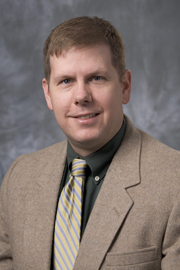 He watches television coverage of the devastation in Louisiana and Mississippi with horror and frustration. Everything he knows in New Orleans is gone. Five of the seven hospitals he knows of, and many of which he and his colleagues worked in, are under water.
He watches television coverage of the devastation in Louisiana and Mississippi with horror and frustration. Everything he knows in New Orleans is gone. Five of the seven hospitals he knows of, and many of which he and his colleagues worked in, are under water.
Until July, when Marshall Longwell, M.D., took a job as an emergency room physician and faculty member at UNMC, he had spent the past eight years of his life in New Orleans in medical school and residency training. With family in Baton Rouge, and friends and colleagues in New Orleans, he can only stand by and watch in shock.
Though the houses his parents and sister live in in Baton Rouge have been left intact, there is no electricity and the economic impact of Hurricane Katrina is incomprehensible.
“Baton Rouge will be fine, but it will take another week and a half to get electricity,” said the UNMC assistant professor of surgery.
Dr. Marshall worries about his grandmother who survived the storm when it hit the Mississippi Gulf Coast where she lived. But the family has not heard from her since. He also is concerned for his friends, colleagues and people of New Orleans.
“All my friends who just graduated from residency with me can’t work now because their hospital is destroyed,” Dr. Longwell. “There’s no health care. The hospitals in New Orleans won’t be serviceable for several weeks. The basements are filled with water as are the first floors. I saw a nurse I know on CNN (Cable News Network). The nurses are starting IVs on each other to keep hydrated because there’s no water,” he said.
If he could clear his schedule and pay his mortgage, Dr. Longwell said he’d go south within the hour to help in any way he could. He’s making plans to get involved in the local relief effort.
Chris Trahan, M.D., a fellow in plastic surgery at UNMC, and a native of New Orleans.
“My brother just got out of town. My family lost their house. I have an aunt and uncle that I haven’t heard from. To me personally, it’s worse than 9/11. My wife has been crying for two days. The level of human suffering is something that I never thought I would see in this country. Not the people who lost their homes but those people who just have nowhere to go. There are kids being brought into the hospital who are extremely sick and dehydrated. My family will recover, they lost stuff but they haven’t lost lives. I don’t think the city is going to be able to rebuild. A third of the parish where we are from is in the gulf right now. I can’t even put into words how upsetting it is.”
Kris Severe, social work, OB/GYN Department
“I have personal connection with the gulf coast as a graduate of Tulane University’s School of Social Work 1998. My husband is originally from there and most of his family still lives there. We check in with them nightly. It has been difficult to watch the footage and see places that we used to frequent and have fond memories of.”
Nancy Foster, Ph.D., post-doctoral fellow, UNMC Munroe-Meyer Institute – Psychology
As a graduates of Mississippi State University and longtime Mississippi residents, my husband Barry and I have many family members and friends in Mississippi and all apparently have been affected by Hurricane Katrina. My sister, living in Memphis, over 350 miles from the Gulf Coast, continues to live without power. The worst part for Barry and I is that we have not been able to reach family or friends due to either loss of power or damaged cell phone lines.